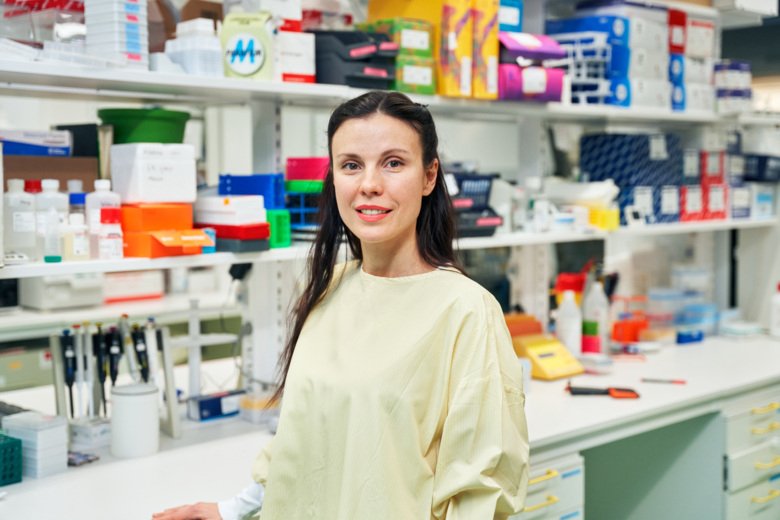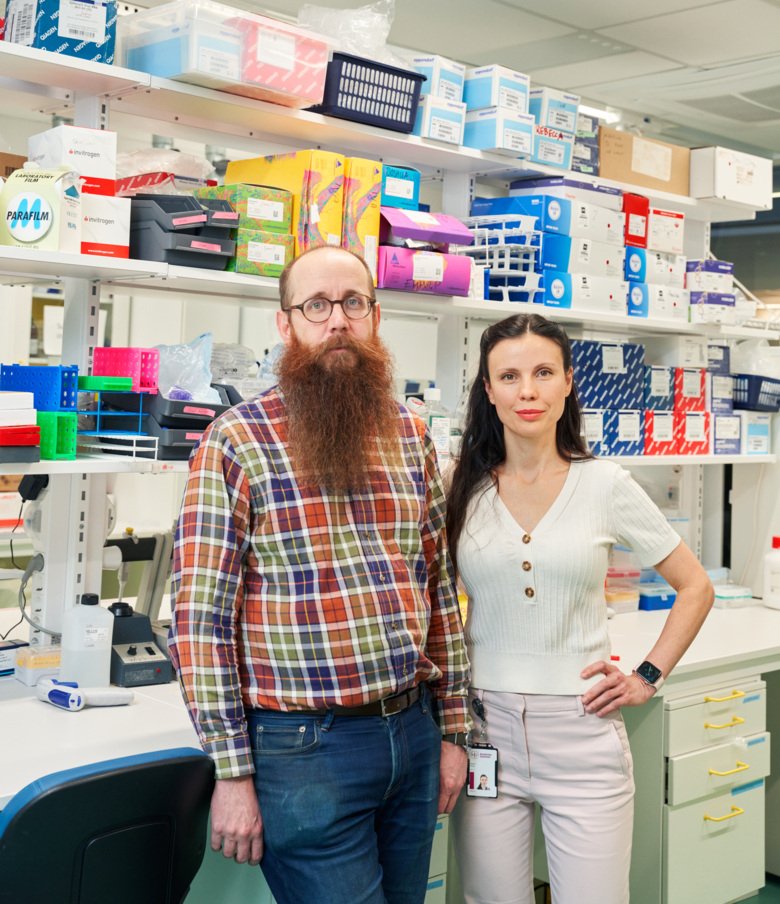Ukrainian scientist fled Russia’s bombs – now she is researching at KI

Nataliia Petryk ran a private clinic in Kyiv helping women give birth when she was forced to flee Ukraine when Russia invaded her country. By following a call by the European Research Council for EU teams to take in Ukrainian scientists, she is now able to conduct research to prevent miscarriage at Karolinska Institutet. Her experience is an example of how science knows no borders.
“Like many others, I was forced to flee Kyiv with our two children when Russia invaded Ukraine,” Nataliia Petryk says. “We were no longer safe, and our stable and fulfilling lives had taken a dramatic turn — one that we could not have imagined even days before the bombing started on 24 February last year. When our youngest son, a happy and lively ten-year-old, saw the explosions with his own eyes, he changed completely. He could no longer sleep at night, worried that we would die.”
The day after the invasion, Nataliia Petryk and her family took their passports and backpacks, spontaneously leaving for the western part of Ukraine, only to find that bomb sirens went off there too. They continued by car towards Poland, but long queues at the border held them back and they turned towards Romania, where they crossed the border on foot.
“My husband returned to Kyiv to do his duty as a medical doctor, while I took a bus with the boys to Italy where we stayed with a childhood friend,” Nataliia Petryk says.
Once there, she searched the internet to plan a new life in a new country.
Found KI through ERC

Just days after the start of the war, the EU funding body, the European Research Council (ERC), had appealed to its grantees across Europe to open up their teams to Ukrainian researchers seeking refuge.
KI researcher Niklas Björkström at the Department of Medicine, Huddinge was one of the many who responded to that call. His medical research at Karolinska Institutet is backed through a large ERC grant.
“Thanks to his tremendous help and a SEK 1 million grant from the Swedish Foundation for Strategic Research (SSF), I was offered a job as a postdoctoral researcher in his group and I settled with our boys in Stockholm,” Nataliia Petryk says. “With my background in medicine, it was a perfect match.”
Ukrainian expertise in a Swedish team
Niklas Björkström’s group studies human natural killer cells, a part of our immune system important in cancer, infections and pregnancy. Nataliia Petryk is a gynaecologist and surgeon by training, but her interest in science has also led her to study chronic inflammation in the uterus, a condition that often leads to widespread intractable diseases that cause infertility and miscarriage during pregnancy. Targeted treatments for these conditions are in high demand.
She completed a PhD in 2021 at Kharkiv National Medical University, a top Ukrainian institution just miles from the border with Russia. Her work on chronic inflammation and premature ovarian failure was published in three international journals.
At the same time, she and her husband ran a private medical clinic in Kyiv where they for example helped women with ovarian failure to give birth from their own eggs using an innovative medical technique.
Sense of purpose
“In the darkness of war, work at Karolinska Institutet gave me back a sense of purpose,” Nataliia Petryk says. “I develop new techniques and take part in high-tech programmes that I hope to use later in Ukraine to provide better treatment to patients in our clinic.”
Among other things Nataliia Petryk and her new colleagues are looking for diagnostic markers that can predict if bleedings during pregnancy, something that happens to many women, will result in miscarriage.
“It is heartening to see that initiatives like these — matchmaking between the ERC‘s researchers and refugees and quick action by foundations like SSF — can change the course of people’s lives, giving them a future,” she says.
Her children are also adjusting to the new reality.
“For my boys, aged ten and fifteen, living in Sweden was hard in the beginning. It was a new country, and they were traumatized. But now they love the educational culture and methods, and they have made friends. They are happy here and that I am being useful — even if the tragic situation in my country is always on my mind.”
Told by Nataliia Petryk to World Economic Forum, ERC and KI.
More opportunities for Ukrainian researchers
Karolinska Institutet has welcomed several Ukrainian researchers since the start of the war. At ERC’s site for Ukrainian researchers, job openings are listed. More funding sources and research support initiatives for academic refugees are listed by the Swedish Research Council.
